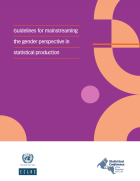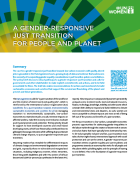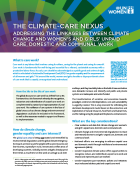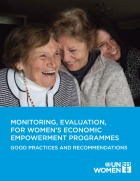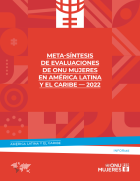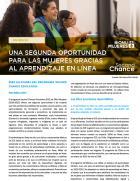Date:
In order to generate data that accurately capture the persistence and magnitude of societal inequalities, the gender and intersectional perspectives must be mainstreamed into statistical production. As noted in the Montevideo Strategy for Implementation of the Regional Gender Agenda within the Sustainable Development Framework by 2030 (2016), it is also crucial for “transforming data into information, information into knowledge and knowledge into political decisions” (ECLAC, 2017a).
Date:
The case for a gender-responsive just transition to low-carbon economies, aligned with the Paris Agreement, is supported by growing data on the need for gender equality in these policies. This brief outlines pathways for a just transition, urging governments and stakeholders to commit to concrete actions and accountability. It also provides recommendations for building sustainable economies that ensure the survival and flourishing of the planet for current and future generations.
Date:
Care work encompasses labor that involves caring for others, the planet, and oneself. It is essential for well-being and crucial to a sustainable economy with a productive workforce. Therefore, care should be recognized as a public good and a universal right, as outlined in Sustainable Development Goal (SDG) 5 on gender equality and the empowerment of women and girls. However, globally, women and girls bear an unequal share of unpaid, unrecognized, and undervalued care work.
Date:
El documento de trabajo “Política exterior feminista: Soluciones para un mejor mañana” recopila los principales insumos preliminares, propuestas y recomendaciones emanadas de las sesiones de la III Conferencia Ministerial sobre Política Exterior Feminista, que tuvo lugar en la Ciudad de México del 1 al 3 de julio de 2024. La III Conferencia generó un espacio de diálogo entre actores comprometidos con la ejecución de políticas exteriores con perspectiva de género y feminista para compartir buenas prácticas, lecciones aprendidas y desafíos comunes de implementación, y desde allí identificar soluciones innovadoras rumbo a las negociaciones del Pacto del Futuro que se acordará en el marco de la Cumbre del Futuro en septiembre 2024.
Date:
This document aims to capture the lessons learned and best practices in Monitoring, Evaluation, and Learning (MEL) in women's economic empowerment programs, based on the experience of the Second Chance Education and Vocational Training Program, implemented by UN Women in Chile.
Date:
The advance of anti-rights groups and the impact of the crisis on national accounts may negatively affect the Machineries for the Advancement of Women (MAMs) in two areas: On the one hand, it may affect the institutionality of the entity, promoting a more "family" centered approach, undermining its capacity to influence the State to promote laws, public policies, and budgets focused on achieving gender equality and women’s empowerment. On the other hand, it may further reduce the budget to which the MAMs have access, making it even more challenging to finance specific programs aimed at closing gaps.
Date:
Digital inclusion is a goal that must be attained urgently due to the importance acquired by the 4.0 industry. The labour market and education have undergone changes due to the incorporation of technology, especially the evolution experienced during the pandemic with the digitization of several processes that facilitate doing paperwork, work, and education, among others. Promoting the participation of women in the digital world allows them to progress in their autonomy and reduce the gender gap.
Date:
In line with international, regional, and national commitments regarding gender equality and women's empowerment, it provides a comprehensive analysis of the status of women in the region, supported by statistical and qualitative data. Its main objective is to examine gender inequalities in the region, taking into account the five dimensions of the 2030 Agenda: people, prosperity, planet, collective participation, and peace, also known as the "5 Ps".
Date:
Latin America and the Caribbean is in the midst of cascading crises that are deepening historical and structural inequalities and which disproportionately affect women. It is therefore urgent for the countries of the region to speed up progress towards achieving gender equality and the full exercise of the rights of women, adolescent girls and girls in all their diversity.
Date:
Este documento presenta un estado del arte de los diferentes MAM en América Latina y el Caribe, desde su creación hasta nuestros días, haciendo también un recorrido por el marco normativo que desde la Convención sobre la Eliminación de Todas las Formas de Discriminación contra la Mujer (CEDAW por sus siglas en inglés) y sus Recomendaciones Generales, la Declaración y Plataforma de Acción de Beijing hasta los diferentes acuerdos que conforman la Agenda Regional de Género acordada en la Conferencia Regional sobre la Mujer de América Latina y el Caribe, ponen de relieve la importancia de contar con estos mecanismos como condición necesaria para el avance de la igualdad de género.
Date:
UN Women Chile, through the programme Tu Oportunidad - Second Chance Education, has sought to develop a program for the economic empowerment and social and cultural integration of migrant and refugee women from Afghanistan. This multisectoral initiative was made possible through the inter-agency collaboration of UNHCR and ECLAC and the support of the Afghan-Chilean Cultural Institute Foundation and the Ascend Athletics Foundation as members of civil society.
Date:
This preliminary report summarizes the most extensive qualitative study conducted to date in Latin America and the Caribbean. It investigates 15 cases through in-depth and semi-structured interviews with women with public voices1 based in Argentina, Bolivia, Brazil, Colombia, Cuba, Costa Rica, Ecuador, El Salvador, Guatemala, Honduras, Mexico, Nicaragua, Paraguay, Uruguay, and Venezuela. All of them have faced severe online attacks due to their gender, stemming from their journalistic activities and activism. The selection of interviewees was carried out by the organizations that make up the Regional Alliance.
Date:
UN Women Chile, through the programme Tu Oportunidad - Second Chance Education, has sought to develop a program for the economic empowerment and social and cultural integration of migrant and refugee women from Afghanistan. This multisectoral initiative was made possible through the inter-agency collaboration of UNHCR and ECLAC and the support of the Afghan-Chilean Cultural Institute Foundation and the Ascend Athletics Foundation as members of civil society.
Date:
This document is a systematization of the series of dialogues "Towards people-centered Comprehensive Care Systems and Policies: Dialogues between Latin America, the Caribbean, and the European Union" which aims to serve as a guide to identify policies, regulations, initiatives and actions that put each of the priority populations at the center of comprehensive care systems: persons with disabilities, older persons, children and paid and unpaid care workers, with the objective of moving towards a care society.
Date:
The Women, Local Economy, and Territories (MELYT) program implemented by UN Women, the United Nations entity dedicated to promoting gender equality and women's empowerment and funded by the Italian Ministry of Foreign Affairs and International Cooperation (MAECI), through the Italian Agency for Development Cooperation (AICS), promotes the economic empowerment of rural women for the development of strong local economies, more equitable societies, and a better quality of life.
Date:
UN Women and BIT developed and tested behaviorally-informed messages intending to encourage men to intervene when witnessing digital violence against women. We also explored potential mechanisms.
Date:
The UN Women Regional Office for the Americas and the Caribbean presents the regional report to analyze the progress of indicator 5.c.1 in the region. In 2021, 10 Latin American and Caribbean States, Bolivia, Brazil, Chile, Colombia, Dominican Republic, Ecuador, El Salvador, Guatemala, Panama, Paraguay and Panama, sent their responses to the voluntary questionnaire that measures progress towards indicator 5.c.1 of the SDGs. In this way, a more detailed view of the progress of indicator 5.c.1 in the region is sought, with the objective of promoting actions and policies that promote gender equality and the empowerment of women. It is important to note that the involvement and cooperation of the countries in the submission of data is fundamental to strengthen this type of report and generate a positive impact on the promotion of equality in the region.
Date:
This report aims to facilitate the strategic use of the evidence generated through the evaluation reports of UN Women in the Latin American and Caribbean region. For this, a systematic review of 9 evaluation reports completed in 2022 in the region was carried out in the key programmatic areas of UN Women to identify main findings, good practices, and potential improvements in UN Women’s work in the areas to be explored.
Date:
In this brief, the top 10 lessons from the United Nations Women's Second Chance Education (SCE) program regarding online learning are gathered. The program provides a second chance for women who have lost the opportunity to access education and training opportunities. Online learning has been one of the fundamental components of the program, which has been implemented in various contexts, including those where participants have low levels of literacy and digital knowledge.
Date:
The Country Portfolio Evaluation of UN Women Ecuador provides a systematic assessment of the organization's normative, coordination and programmatic contribution to development results related to gender equality and women’s empowerment at the country level over the 2019-2022 period.

